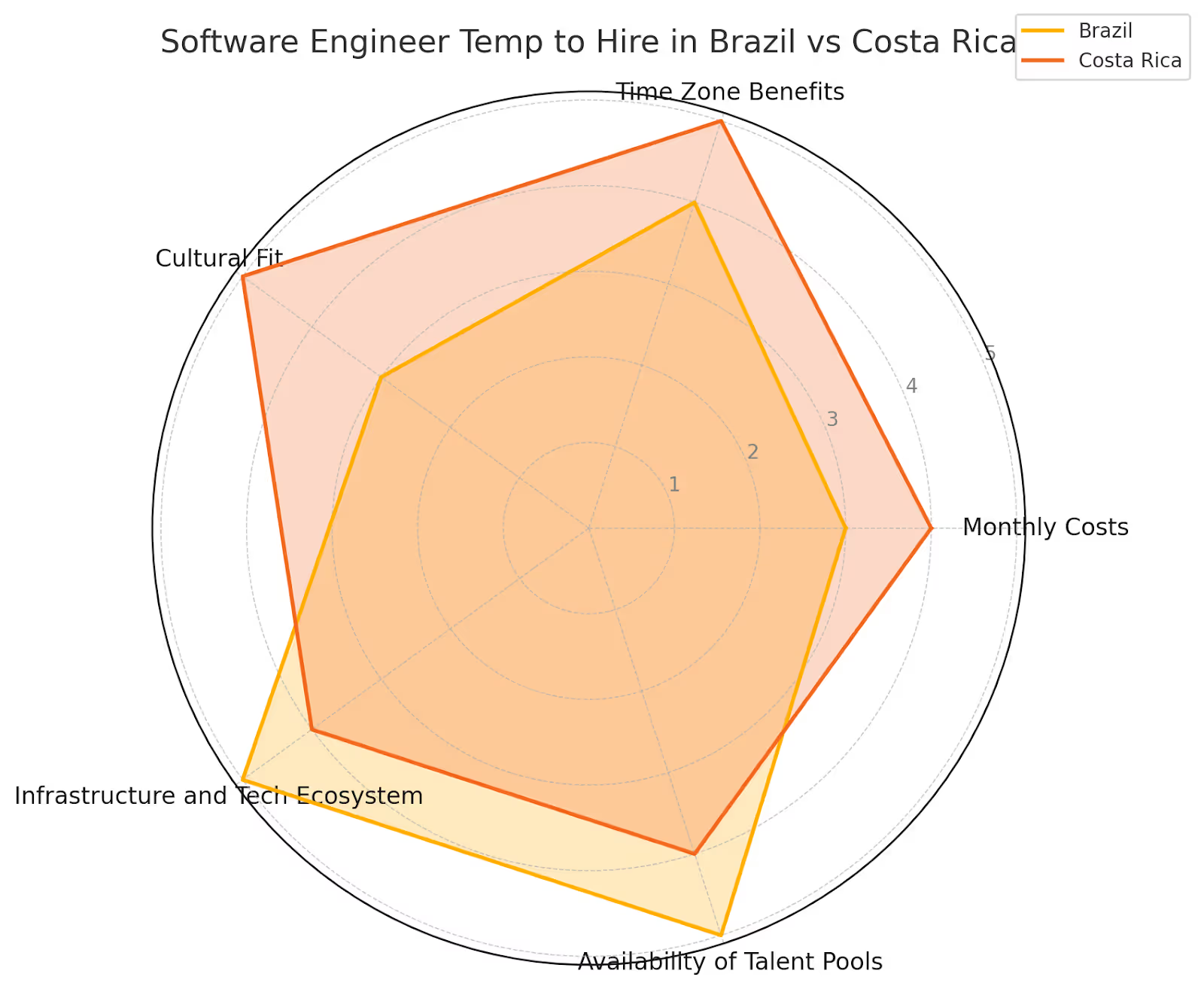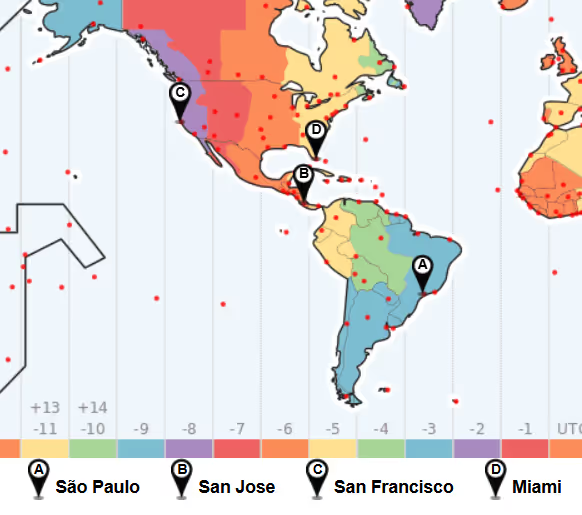Hiring a software engineer on a temporary basis is an excellent way to access high-level talent while maintaining flexibility in your hiring strategy. For companies exploring options in Latin America, Brazil and Costa Rica are two of the top destinations. But how do you decide which country best suits your needs?
In this guide, we'll compare five key aspects of hiring a temporary software engineer in Brazil versus Costa Rica to help you make an informed decision. Whether you're looking for cost-effectiveness or bilingual professionals ready to hit the ground running, we've got you covered.
Learn more about nearshore software development: The Complete Guide.
Software Engineer Temp to Hire in Brazil vs. Costa Rica
The chart below compares Brazil and Costa Rica as destinations for software engineer temp to hire basis. Each criterion evaluated reflects key aspects such as cost, time alignment, cultural compatibility, technology infrastructure, and talent availability. This visual tool makes it easy to identify the strengths and areas of opportunity in both countries, helping you make informed decisions.

Next, we will explore each of the issues evaluated in the chart in detail, analyzing how Brazil and Costa Rica compare in these key categories for hiring software engineers.
Monthly Costs for Software Engineer Temp to Hire
When considering the monthly costs for software engineer temp to hire positions, it's essential to compare expenses between Brazil and Costa Rica.
Brazil: The average salary for a temporary software engineer ranges from $5,000 to $6,500 per month, depending on experience and region. However, additional costs such as taxes and benefits can increase total expenses by 30%-40%.
Costa Rica: Software engineers typically earn between $3,800 and $4,500 per month. Taxes and benefits are generally lower than in Brazil, making it easier to predict total costs.
For companies prioritizing cost-effectiveness, Brazil often edges ahead, but Costa Rica’s predictability may provide peace of mind.
Find out more about how software staff augmentation can be made easy and effective.
Time Zone Benefits
Time zones play a critical role in smooth collaboration, especially when working with contingent software engineers. Overlapping work hours can increase productivity, reduce communication delays, and improve team alignment.
Brazil: In Brazil, the country spans three time zones, and major technology hubs such as São Paulo typically operate on GMT-3. This time zone closely matches the U.S. Eastern Standard Time (ET), making it convenient for companies in New York or Miami to collaborate during standard business hours.
Costa Rica: Costa Rica operates on Central Standard Time (CST), which perfectly matches the business hours of many U.S. cities, such as Chicago or Dallas, and even aligns well with Pacific Time for morning meetings.
Learn more about nearshore staff augmentation: Scale your team with agility.

Infrastructure and Tech Ecosystem
Both countries have strong technology ecosystems, but they differ in scope and maturity, making them unique options for hiring a software engineer temp to hire based on your company’s priorities.
Brazil: As the largest economy in Latin America, Brazil has extensive infrastructure and a vibrant technology ecosystem. Major cities such as São Paulo and Rio de Janeiro are the epicenter of innovation, hosting accelerators, co-working spaces, and tech events that drive the development of new ideas.
São Paulo led as the city with the highest concentration of startups in the country, with more than 22% of the total, followed by Rio de Janeiro with 4.4%.
The country has approximately 13,000 active startups, consolidating its position as the most important innovation center in Latin America. In addition, Brazil ranks among the top five economies in the world with the highest startup creation rates, confirming its position as a benchmark in the global technology scene.
Costa Rica: A strong commitment to sustainability and innovation has made the country an attractive destination for technology companies from around the world.
Costa Rica's IT services market is booming, excelling in software development and outsourcing. This strategic approach has attracted the attention of international companies seeking efficient and cost-effective solutions. It is estimated that this market will reach revenues of US$482.40 million by 2025, reflecting its sustained growth.
In addition, recent strategic alliances, such as the designation as a key ally of the United States under the CHIPS and Science Act, have consolidated Costa Rica's position in the global landscape.
Talent Pool Availability
Brazil: With a population of more than 215 million, Brazil has a large pool of software engineers, which is a significant advantage in terms of diversity and volume. It is estimated that the IT services sector in Brazil currently employs more than 630,000 software engineers, of which approximately 133,000 specialize in software development.
Costa Rica: Costa Rican engineers often have experience working with international clients, making them ideal candidates for temporary positions. The country's educational system produces more than 4,000 engineering graduates each year, providing a valuable solution to talent shortages in markets such as the U.S. and Canada. In addition, geographic proximity allows for seamless and efficient collaboration between teams in San Jose and offices in North America.
For companies requiring specific skills, Costa Rica's concentrated talent base may be more appropriate, while Brazil offers broader options.
Cultural Fit and Communication Skills
Cultural compatibility is crucial in building cohesive teams.
Brazil: Engineers here often excel in creativity and innovation. While English proficiency is growing, it can still vary significantly by region. Engineers in São Paulo and Rio de Janeiro typically have better English skills compared to those in smaller cities.
Costa Rica: Known for its strong emphasis on bilingual education, Costa Rican engineers often speak English fluently. Their cultural familiarity with U.S. business norms also makes onboarding smoother.
Transparent recruiting with Teilur Talent
Teilur Talent is revolutionizing the international recruiting industry by offering unmatched transparency in software engineer temp to hire roles. Unlike many competitors, Teilur Talent discloses its margins, which never exceed 20% of the payment made to candidates. This ensures both clients and developers know exactly where their money is going, fostering trust and a more collaborative working relationship.
Salaries through Teilur Talent’s network vary by country and candidate experience, but they’re always all-inclusive and competitively priced. This means clients get exceptional value, and developers receive fair compensation for their skills.
By prioritizing transparency and fairness, Teilur Talent is setting a new standard in international recruiting, ensuring every hire—whether temp-to-hire or permanent—is a success for both parties.
Learn more about how Teilur Talent's pricing is disrupting the recruiting industry with transparency.
FAQ
How much does it cost to hire a software engineer?
In Brazil, hiring a temporary software engineer typically costs $5,000–$6,500 per month, while in Costa Rica, the range is $3,800–$4,500.
How to hire the right software engineer?
Define the skills and experience you need, consider cultural fit, and partner with staffing agencies that specialize in temp-to-hire roles.
Is it difficult to hire software engineers?
While it can be competitive, both Brazil and Costa Rica offer excellent resources for finding qualified candidates.
How long does it take to hire a software developer?
The timeline varies, but with the right resources, you can find and onboard a software engineer temp to hire within 2–6 weeks.
Conclusion
When deciding between Brazil and Costa Rica for hiring a software engineer temp to hire, it all comes down to your company's specific needs and priorities. Brazil offers a deep talent pool, cost-effective options, and a thriving tech ecosystem, making it ideal for companies seeking diversity and scale. Meanwhile, Costa Rica's bilingual workforce, cultural alignment with the U.S., and seamless time zone compatibility make it an excellent choice for teams that value real-time collaboration and efficient communication.
Both countries bring unique strengths to the table, and choosing the right one can take your projects to new heights. To help you make the best decision, use the calculator below to estimate your costs and potential savings. For more details and a personalized consultation, please contact us.








